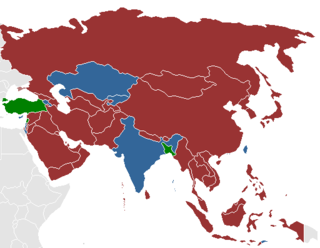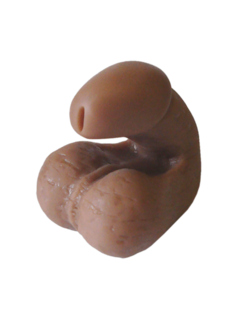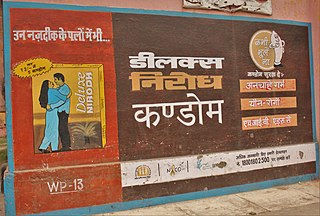
A condom is a sheath-shaped barrier device used during sexual intercourse to reduce the probability of pregnancy or a sexually transmitted infection (STI). There are both male and female condoms. With proper use—and use at every act of intercourse—women whose partners use male condoms experience a 2% per-year pregnancy rate. With typical use the rate of pregnancy is 18% per-year. Their use greatly decreases the risk of gonorrhea, chlamydia, trichomoniasis, hepatitis B, and HIV/AIDS. To a lesser extent, they also protect against genital herpes, human papillomavirus (HPV), and syphilis.

Safe sex is sexual activity using methods or contraceptive devices to reduce the risk of transmitting or acquiring sexually transmitted infections (STIs), especially HIV. "Safe sex" is also sometimes referred to as safer sex or protected sex to indicate that some safe sex practices do not completely eliminate STI risks. It is also sometimes used colloquially to describe methods aimed at preventing pregnancy that may or may not also lower STI risks.

Mechai Viravaidya is a former politician and activist in Thailand who promoted condoms, family planning and AIDS awareness in Thailand. Since the 1970s, Mechai has been affectionately known as "Mr. Condom", and condoms are often referred as "mechais" in Thailand. From the time that he began his work, the average number of children in Thai families has decreased from 7 to 1.5.
Tata Motors Limited is an Indian multinational automotive manufacturing company, headquartered in the city of Mumbai, India which is part of Tata Group. The company produces passenger cars, trucks, vans, coaches, buses, luxury cars, sports cars, construction equipment.

Prostitution is legal in India, but a number of related activities including soliciting, kerb crawling, owning or managing a brothel, prostitution in a hotel, child prostitution, pimping and pandering are illegal. There are, however, many brothels illegally operating in Indian cities including Mumbai, Delhi, Kolkata, Bangalore, and Chennai. UNAIDS estimate there were 657,829 prostitutes in the country as of 2016. Other unofficial estimates have calculated India has roughly 3–10 million prostitutes. India is widely regarded as having one of the world's largest commercial sex industry. It has emerged as a global hub of sex tourism, attracting sex tourists from wealthy countries. The sex industry in India is a multi-billion dollar one, and one of the fastest growing.

HIV/AIDS in India is an epidemic. The National AIDS Control Organisation (NACO) estimated that 2.14 million people lived with HIV/AIDS in India in 2017. Despite being home to the world's third-largest population of persons with HIV/AIDS, the AIDS prevalence rate in India is lower than that of many other countries. In 2016, India's AIDS prevalence rate stood at approximately 0.30%—the 80th highest in the world. Treatment of HIV/AIDS is primarily via a "drug cocktail" of antiretroviral drugs and education programs to help people avoid infection.

Red Ribbon Express is an HIV/AIDS awareness campaign train by the Indian Railways. The motto of the Red Ribbon Express is "Embarking on the journey of life".

Packing is wearing padding or a phallic object in the front of the pants or underwear to give the appearance of having a penis or bulge. Packing is commonly practiced by trans men. People who cross-dress as male may also "pack".

A female condom is a barrier device that is used during sexual intercourse as a barrier contraceptive to reduce the probability of pregnancy or a sexually transmitted infection (STI). Meant as an alternative to the condom for males, it was invented by Danish MD Lasse Hessel and designed to be worn internally by the female partner during vaginal sex to prevent exposure to ejaculated semen or other body fluids. His invention was launched in Europe in 1990 and approved by the FDA for sale in the USA in 1993. Its protection against STIs is inferior to that of male condoms. Internal condoms can be used by the receptive partner during anal sex.

The People's Republic of China's first reported AIDS case was identified in 1985 in a dying tourist. In 1989, the first indigenous cases were reported as an outbreak in 146 infected heroin users in Yunnan province, near China's southwest border.
Prostitution in Kolkata is present in different forms and Kolkata's sex industry is one of the largest in Asia. Prostitution may be brothel-based or non-brothel based as in the case of call girls. India is regarded as having one of the largest commercial sex trades globally. Kolkata has many red-light districts, out of which Sonagachi is the largest red-light district in Asia with more than 50,000 commercial sex workers.
The history of condoms goes back at least several centuries, and perhaps beyond. For most of their history, condoms have been used both as a method of birth control, and as a protective measure against venereal diseases such as syphilis, gonorrhea, chlamydia, hepatitis B and more recently HIV/AIDS. Condoms have been made from a variety of materials; prior to the 19th century, chemically treated linen and animal tissue are the best documented varieties. Rubber condoms gained popularity in the mid-19th century, and in the early 20th century major advances were made in manufacturing techniques. Prior to the introduction of the combined oral contraceptive pill, condoms were the most popular birth control method in the Western world. In the second half of the 20th century, the low cost of condoms contributed to their importance in family planning programs throughout the developing world. Condoms have also become increasingly important in efforts to fight the AIDS pandemic. The oldest condoms ever excavated were found in a cesspit located in the grounds of Dudley Castle and were made from animal membrane. The condoms dated back to as early as 1642.

Sexually transmitted infections (STIs), also referred to as sexually transmitted diseases (STDs) and the older term venereal disease, are infections that are spread by sexual activity, especially vaginal intercourse, anal sex and oral sex. STIs often do not initially cause symptoms, which results in a risk of passing the infection on to others. Symptoms and signs of STIs may include vaginal discharge, penile discharge, ulcers on or around the genitals, and pelvic pain. Some STIs can cause infertility.
Infection rates of HIV/AIDS in Mali are estimated to be under 2%, which is relatively low compared to other parts of Africa, although the infection rate is higher among women of childbearing age. However, this figure is most likely deceptive; the problem in attempting to estimate infection rates is that voluntary testing is rare. Women who give birth in a hospital are automatically tested, but others in the general population rarely present themselves for testing. National education campaigns have targeted the general population since the late 1990s, as government and international organizations are concerned that Malians may be vulnerable to the spread of the pandemic. Since 2002, the Supreme National Council for AIDS (HCNLS) has coordinated educational campaigns around sexual activity and condom use to stem HIV infection. Condom use remains low by international standards.
In 2016, the prevalence rate of HIV/AIDS in adults aged 15–49 was 0.3%, relatively low for a developing country. This low prevalence has been maintained, as in 2006, the HIV prevalence in Mexico was estimated at around 0.3% as well. The infected population is remains mainly concentrated among high risk populations, men who have sex with other men, intravenous drug users, and commercial sex workers. This low national prevalence is not reflected in the high-risk populations. The prison population in Mexico, faces a fairly similar low rate of around 0.7%. Among the population of prisoners, around 2% are known to be infected with HIV. Sex workers, male and female, face an HIV prevalence of around 7%. Identifying gay men and men who have sex with other men have a prevalence of 17.4%. The highest risk-factor group is identifying transgender people; about 17.4% of this population is known to be infected with HIV. Around 90% of new infections occur by sex-related methods of transmission.. Of these known infected populations, around 60% of living infected people are known to be on anti-retroviral therapy (ART).
For the 1937 test launches of the A3 rockets in Germany, see Operation Lighthouse (1937).
The relationship between religion and HIV/AIDS has been an ongoing one, since the advent of the pandemic. Many faith communities have participated in raising awareness about HIV/AIDS, offering free treatment, as well as promoting HIV/AIDS testing and preventative measures. Christian denominations, such as Lutheranism and Methodism, have advocated for the observance of World AIDS Day to educate their congregations about the disease. Some Churches run voluntary blood testing camps and counselling centers to diagnose and help those affected by HIV/AIDS.

Moods Condoms is a manufacturer of condoms made from natural rubber latex. It is manufactured HLL Lifecare Limited, a Government of India undertaking. HLL was started off in 1966 with the objective of producing condoms for the National Family Planning Program. Moods Condoms came into existence in mid-1968, when HLL Lifecare Limited decided to develop a product to target the premium and upper middle class segment of the urban population in India. HLL today is one of the world's largest manufacturers of condoms. As of December 2012, its annual production totals around 800 million pieces across the globe.

This is L. Inc. (L.) is a privately held, California based social enterprise and public-benefit corporation that makes organic personal care products. The company has a one-for-one give back model: for every product sold, one is made accessible to a person who needs it. L. has supported a network of over 4,000 female entrepreneurs around the world and is on track to give over 200 million health products. L. is the fastest growing feminine care company in the United States according to the market research group IRI. On February 5, 2019, it was announced that P&G acquired This is L.

Nirodh is the first condom brand produced in India. Introduced in 1968, the condom is credited with the success of the family planning and birth control campaign in the country. From 2.40% in 1964, India's population growth rate dropped to 1.80% by 2005 with the help of Nirodh. As of 2015, population growth rate of India was 1.26%.











